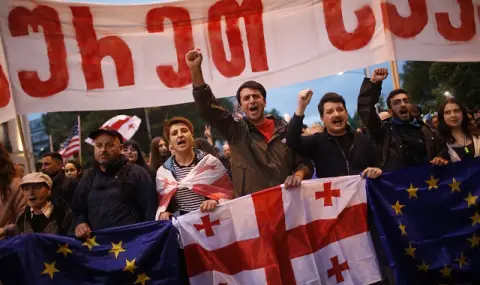Tbilisi's move to effectively suspend the country's bid to join the EU until 2028. is "heartbreaking". This was stated by the ambassador of the European Union in Georgia, Pavel Herchinski, quoted by "Reuters".
He condemned police violence against protesters at a pro-European demonstration yesterday.
Police used water cannons, pepper spray and tear gas against masked young protesters angry at the decision of the ruling party "Georgian Dream" to stop EU accession negotiations because of the "blackmail" from Brussels.
"We regret that violence was used against peaceful protesters," Herczynski said.
He described the decision to freeze membership talks as "very unfortunate, heartbreaking".
"What happened yesterday clearly contradicts the policy of the previous government of Georgia, in fact of all previous governments of Georgia, it also contradicts the will of the vast majority of the population of Georgia. Public opinion polls show that EU membership is supported by about 80% of Georgia's population, and the goal of joining the bloc is written into the country's constitution, he stressed.
About 112 active Georgian diplomats have signed an open letter denouncing the government's suspension of EU accession talks as unconstitutional.
Georgia's interior ministry said earlier today that 43 people were arrested during the protest last night. 32 police officers were injured during the protest, in which some demonstrators tried to tear down metal barriers in front of the parliament.
The Coalition for Change, the country's largest opposition party, said two of its female leaders were assaulted by police during the protest, with one suffering a broken arm and another a broken nose.
"Today we have only one job - service to the country, so that tomorrow we have a country and our children have a future,", another leader of the Coalition for Change, Nika Melia, wrote on Facebook. He called for new protests today.
Although Georgia is a candidate country for EU membership, its relations with Brussels have deteriorated sharply in recent months due to accusations by politicians in the Union that Tbilisi is pursuing pro-Russian and authoritarian policies.
The EU itself said earlier this year that Georgia's application was frozen in response to new laws passed against "foreign agents" and the rights of the LGBT community, which critics say are draconian and inspired by Moscow.
The government does not have diplomatic relations with Russia and insists that the laws are proportionate and necessary to protect national security and the traditional values of society.
"Georgian Dream," believed to be controlled by its billionaire founder, former Prime Minister Bidzina Ivanishvili, has in recent years taken steps to deepen ties with Russia and China.
The party won elections in October with almost 54% support, but opposition parties said the vote was rigged and refused to take their seats in parliament.
The European Parliament yesterday refused to recognize the elections in the country and called for sanctions on key figures of the "Georgian Dream".
